9 Awesome Methods to Find Blog Topics to Write About
Published 21 January 2021 by Miles in Digital Marketing
You've been tasked with writing a new post on your business blog, yet you are all out of fresh ideas for topics to cover? Have no fear! That's a common issue and this article was written to solve it for you.

Writing inspiration at a low? It's ok. We’ve all been there at one point or another.
You understand the benefits of blogging, and you have a good publishing workflow. You have been writing and publishing new blog posts regularly, and your website is naturally enjoying more traffic and engagement. Then you find that your topic ideas start drying up. It’s getting harder to think of blog topics to write about.
This is one of the biggest problems facing business bloggers across the globe. Thankfully, there are some fantastic ways to fix this, and fast. In this article, I will cover nine different methods that I personally have used in action, to discover interesting blog topics to write about, that both engage your audience and provide real value to them.
The nine methods to find great blog topics to write about, are;
- Embrace search predictions
- Ask your customers
- Spy on your current readers
- Review your search performance
- Bestselling book contents
- Ask your team
- Look at current trends
- Answer questions asked on communities
- Review your competitors
You can click on the names above to jump straight to that section, or scroll down to read this article in full (recommended).
Ok, let’s get into each method to find blog topics to write about in more detail.
Embrace search predictions
No doubt you have noticed this before. When you start typing a search query on Google, they often display search terms in a drop down as you type. These are what are called ‘search predictions’. These search predictions are generated from popular and trending topics that are relevant, your own search habits (if you are logged in) and popular topics.
Let’s say you have a blog on your plant nursery website, and you want to write an article about indoor plants. You could find interesting topics by simply typing ‘water indoor plants’. The search predictions that appear can either be longer blog posts or they could be included as part of a future blog topic.
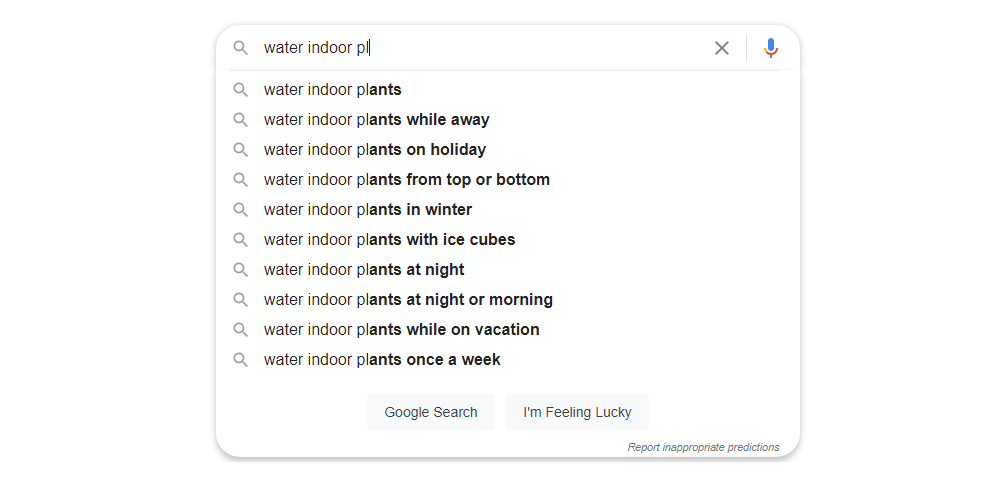
A blog post on watering indoor plants with ice cubes would be interesting; I didn’t realise that is a thing.
If you don’t find a few topics immediately, try variations of the topic query. Maybe ‘home plants’ or ‘pot plants’ will generate more suitable topics for you.
Be aware though, that you should be writing for humans first, and search engines secondly. My previous post on lessons from building a high traffic blog goes into more detail why you need to consider it in that order.
Ask your customers
Another fantastic way to get blog topics to write about is to literally ask your audience. If you can, just ask your customers when you interact with them. It could be as simple as ‘what did you want to know more of, when it comes to [your industry or product]? For example ‘Hey Miles, what did you wish you knew about indoor plants?
Obviously, you will get plenty of strange one-off questions or topics, however the more customers you ask, the more themes you will start to see, that are worthy of a well written blog post.
Spy on your current readers
You can easily take a look at your best performing posts as well as other important metrics in Google Analytics, and see if there’s anything else you could pen on a similar topic.
Let’s say you notice that your top five blog posts are all about how to propagate various indoor plants. This could then lead to topics on growing plants from cuttings, both indoor and outdoor, growing plants from seeds, which are the easiest plants for beginners to grow, etc.

Review your search performance
As well as analytics, your Google search console reports also have some real gold in there too. In the example below, I have looked at the Performance page. The first column are search queries, the second are the amount of searches that resulted in a click to your website, and the third is the amount of times your page was shown in results (also known as an impression).
As you can see in this example, although 2,658 people saw our page in search results, only a measly four people clicked on it.

This could be because the page is out of date, or the topic is not as engaging as other similar websites. I would search that phrase in google, and look at the top handful of results. What makes theirs better than your page?
Writing a bigger more detailed and more valuable blog post or guide on this topic, may be the answer. Could you add more images, or provide a downloadable resource, or a growing guide and calendar specifically for Australia, etc?
If you don’t know your way around Google search console, we have written a great guide to Google Search Console for website owners.
Bestselling book contents
There’s a very good chance that there are books for sale about your blog topic or business industry. For example, there’s a million and one web design books, and there are tens of thousands of books on gardening.
Amazon have a really good feature, called ‘Look inside’, which appears above the books cover image on many of their book results pages. This allows you to take a quick look at the table of contents, without having to go into a physical bookstore and thumb through their shelves.
Take a look at best seller lists that are related to your topics. If people are buying copies of the book, then it stands to reason there’s some real value inside. Don’t read the chapter, just look at the naming. Does this spark some inspiration for blog topics to write about?
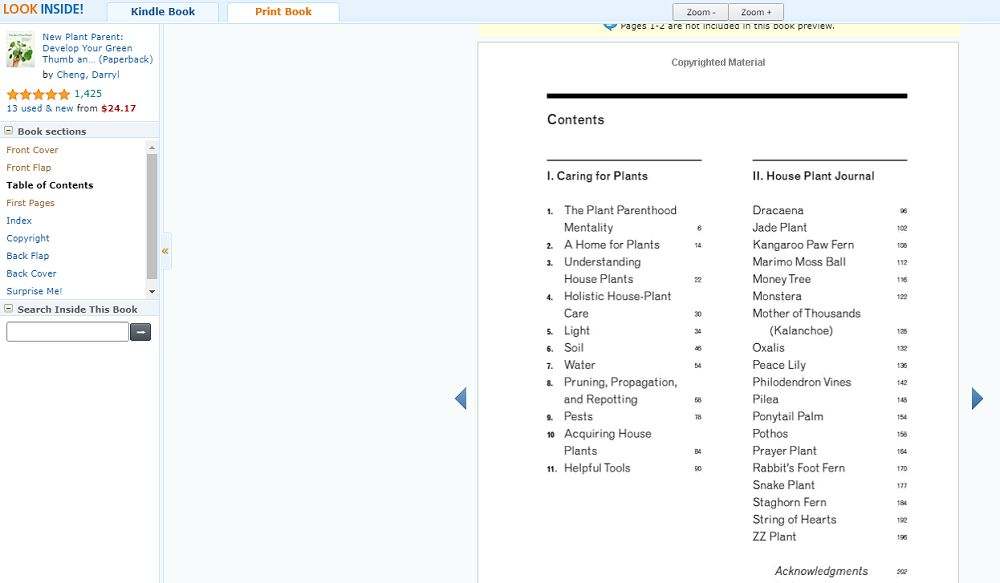
In this example above, every one of those chapters could easily be a detailed blog post in itself. Couple that first column with the list of house plants, and you’ve got dozens of topic ideas. You could start lists such as (topic) for (specific plant). An example would be Best Soil Types for Growing Kangaroo Plants or How to Prune Snake Plants to Encourage Growth.
Ask your team
Another interesting way to find blog topics to write about, is to ask your front line employees. They are the ones who often give advice or answer questions from customers, so they are likely aware of what are some common questions or topics of conversation among your clients or customers.
Ask your reception staff, sales people or customer service employees for questions they often get asked. The answers will often be surprising, and be worthy of putting a great post together, to save the repetitive answering your team have to often do, and also provide valuable content at the same time.
Look at current trends
Notwithstanding the current coronavirus or USA election fever, there are plenty of other search trends that are growing and subsiding over time. If you type in a topic idea into Google Trends, they will display a page such as the below.
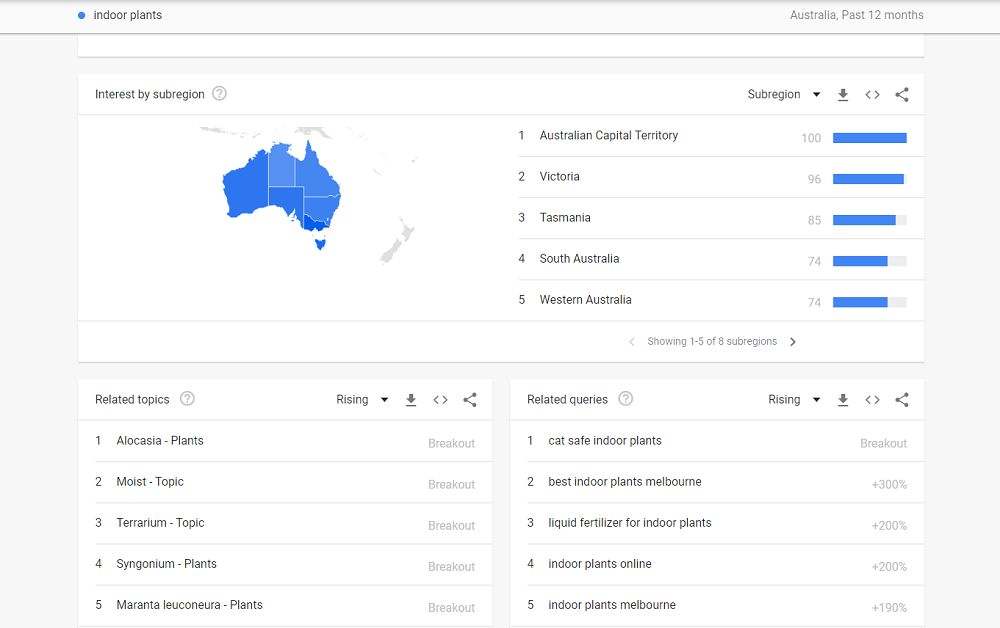
This example, last 12 months search trends in Australia for the search query, ‘indoor plants’, gives you some great blog topics immediately, under both the Related Topics and Related Queries panels.
Sadly, we can also see that it seems WA are the fifth state for green thumbs. Lift your game, West Australians.
Answer questions asked on communities
Question and answer websites such as Quora or broader communities and discussion forums such as Reddit are great feeding grounds to find blog topics to write about that people are actually interested in knowing about.
Plus, if you take care to write a helpful reply, you could link your new blog post in an answer to those questions that inspired your post.
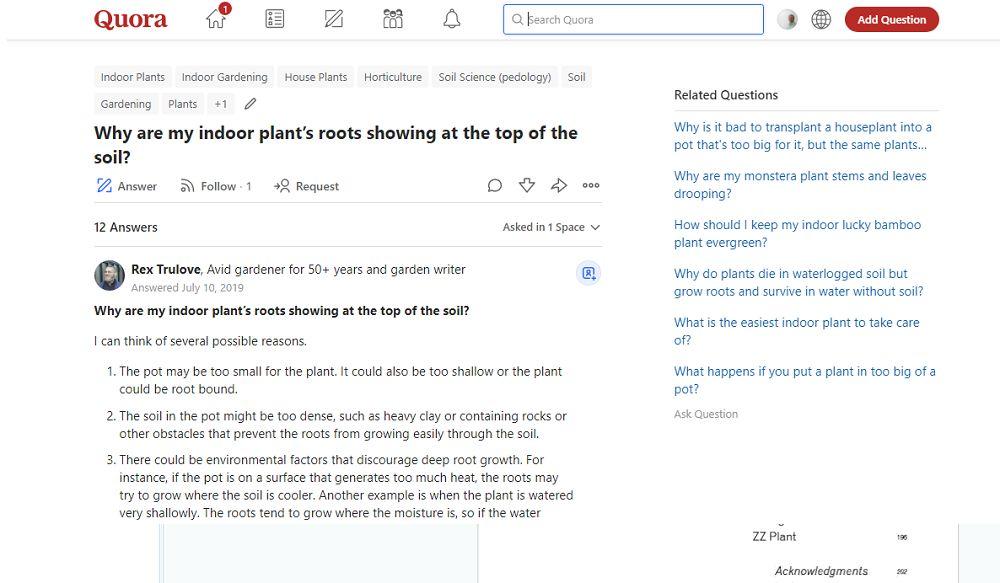
Look at your competitors
When in doubt, look at your competitors. You can do this a number of different ways. You can search for topics and look at the top 5-10 results, and see what they cover. Then you set about writing your own version of that topic.
Secondly, you can use specialised software such as Ahrefs, and dig down for keyword data, to reveal what is missing.
In this example, I used the very handy Content Gap feature, and compared three competitors for my blog on indoor plants. This then shows me phrases and keywords that my competitors rank in the top ten for, which my blog or website doesn’t.
For example, my second competitor is in 10th place for the term “how often to water indoor plants” and my blog doesn’t rank at all.
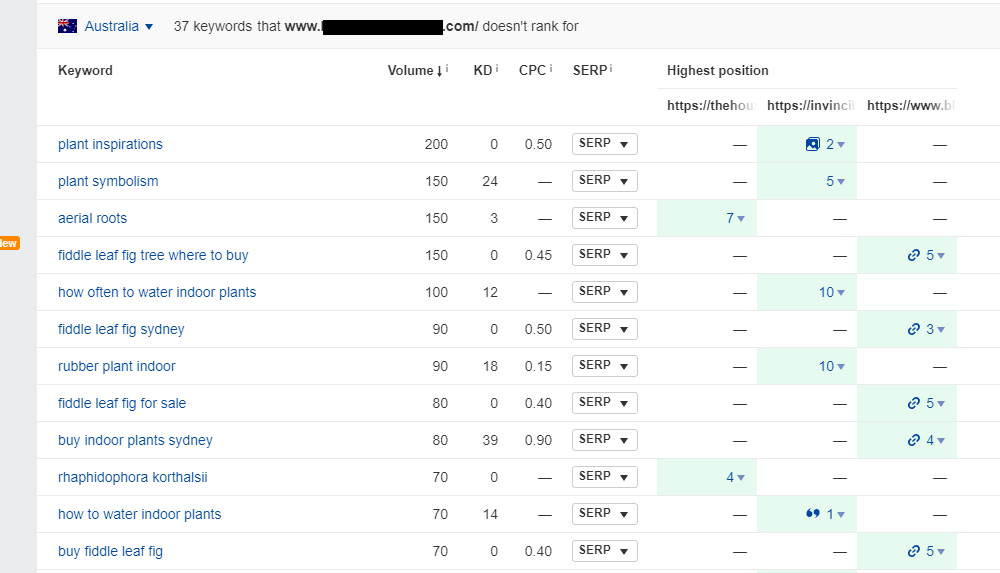
There were 37 keywords here that my blog doesn’t rank for. Do this a few more times with other competitors, and I am sure to have a list of 100+ keywords that are likely to make great topic ideas.
In Summary
There we have it, nine super effective methods to find new blog topics to write about. If you do a handful of these each time you find your inspiration waning, it should keep you full botte with creative ideas for many posts ahead.
To recap, those nine methods to find great blog topics to write about, are;
- Embrace search predictions
- Ask your customers
- Spy on your current readers
- Review your search performance
- Bestselling book contents
- Ask your team
- Look at current trends
- Answer questions asked on communities
- Review your competitors
All the best with your blogging into the future, and for providing great value to your ever growing audience!


